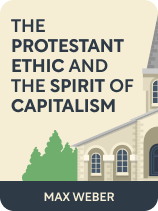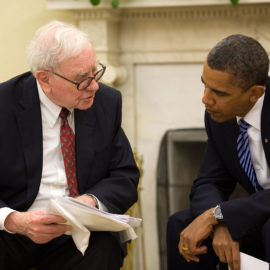

This article is an excerpt from the Shortform book guide to "The Protestant Ethic and the Spirit of Capitalism" by Max Weber. Shortform has the world's best summaries and analyses of books you should be reading.
Like this article? Sign up for a free trial here.
What’s “the Protestant ethic”? How did it give rise to modern capitalism?
In The Protestant Ethic and the Spirit of Capitalism, Max Weber contends that the Protestants’ way of life laid the seeds for capitalism to emerge as a full-fledged economic system. His argument in The Protestant Ethic is considered a classic and is often compared to Karl Marx’s writings on the economic origins of capitalism.
Keep reading for an overview of Weber’s argument presented in the book.
The Protestant Ethic and the Spirit of Capitalism
In The Protestant Ethic and the Spirit of Capitalism, Max Weber discusses the socio-economic and religious roots of modern capitalism—and of our productivity-focused culture. He argues that the Protestant Reformation, a 16th-century European religious movement, changed how people lived, worked, and used their money.
Born in 1864 in Prussia, Weber was a German lawyer, historian, and sociologist and is recognized as one of the founders of modern sociology. Weber wrote extensively on “economic sociology,” a theory he developed to explain how culture and economics mutually influence each other. His main interest was how different religions affected economics. After writing The Protestant Ethic (1905), he analyzed world religions in The Religion of China (1915), The Religion of India (1916), and Ancient Judaism (1917-1919).
We present Weber’s argument in two parts: First, we discuss the question he poses and the answer he gives. Second, we detail the historical account of the Protestant Reformation that he uses to support his thesis.
Weber’s Question and Answer
To begin, we’ll discuss the question that The Protestant Ethic tries to answer. We’ll then look at the big picture of Weber’s argument: What the Protestant ethic is, how it developed, and how it led to the “spirit of capitalism”—the modern capitalist’s distinct morals and way of life.
Weber’s Question: Why Are Protestants Distinctly Prosperous?
Writing from Germany at the turn of the 20th century, Weber observes that, in western Europe and America, most business owners and skilled workers were Protestants. Upon his observation, Weber asks whether and to what extent Protestantism contributed to the development of capitalism. He argues that, if Protestants make good capitalists today, something about their beliefs and way of life must be conducive to capitalism.
Weber’s Answer: Protestantism Is Conducive to Commercial Success
While Weber’s answer to this problem is complex, he essentially asserts that yes, Protestantism did influence the rise of capitalism. Specifically, the Protestant ethic, or way of life, shaped the capitalist lifestyle that prevailed by the 19th and 20th centuries. He explains each of these two concepts as follows:
- The Protestant ethic was how early Protestants conducted their lives in the late 1500s through the 1700s (following the Protestant Reformation). Weber argues that specific Protestant beliefs created a unique way of life—a rational, ascetic lifestyle that broke with the traditional lifestyle of subsistence farming and relaxed living.
- The spirit of capitalism is the money-focused way of life that’s characteristic of modern capitalism. It involves rigorous saving and investing, frugality, and a systematic daily routine. All of these habits, and the beliefs that motivate them, help you succeed as an entrepreneur or middle-class person in a capitalist society.
Weber argues that the former influenced the latter on two levels. First, Protestant beliefs and morality influenced capitalist beliefs and morality. Second, the Protestants’ practical lifestyles influenced capitalist habits and lifestyles. Put together, the Protestant ethic contributed its rigorous, systematic, and rational character to the capitalist way of life.
Over time, the religious zealotry that ushered in Protestantism died down. Through the 1700s and 1800s—long past the Reformation’s start in the early 1500s—people gradually became more secularized. But, while they softened their religious zeal, they retained the practical, systematic way of life that began with the early Protestants. This secularized offspring of the Protestant ethic became, in Weber’s view, the modern capitalist lifestyle.
The Protestant Reformation
Weber gives an account of the Protestant Reformation, the 16th-century European religious movement from which Protestantism sprang forth. He claims that doctrinal developments introduced by Martin Luther, John Calvin, and Richard Baxter produced the Protestant ethic because the doctrines caused people to live more systematically, ascetically, and rationally than ever before. Fueled by piety and fear of God, the Protestants kicked off changes that echo to this day.
Weber emphasizes one key detail of Luther’s Bible translation: To render the notion of God’s preordained purpose for each individual, he used the word calling (beruf, in the original German). This word combined the secular notion of your job or occupation with the religious notion of God’s purpose for you. In doing this, Luther created a wholly new idea: That faithful secular work was the highest moral good you could do. That is, God wants you to work hard in your calling.
According to Weber, John Calvin introduced the key idea that created the Protestant ethic: the doctrine of predestination. Put simply, predestination said that humans are inherently sinful and deserve only death. God chose everyone’s fate at the beginning of time. Some lucky few would be “elect” (saved), while most of humanity was “reprobate” (damned). There was nothing you could do to change this.
This view of God stood in sharp contrast to Luther’s, who taught that you could find salvation through faith and could earn or lose it. Weber argues that, by removing Luther’s more easygoing God, Calvin’s doctrine created a powerful motivation for people to live utterly devoted religious lives (though it differed from Catholicism in its focus on the secular rather than spiritual world).
The everyday Calvinist began to live his life in complete service to God’s will for him. Calvinist pastors taught that, when you work tirelessly in your calling and faithfully regard yourself as elect, God’s favor will manifest in your life as grace. Practically, grace looked like success in your calling and the complete cessation of doubt or worry about your status.
Weber argues that Protestants began to live ascetic, systematic lives in order to attain the state of grace (following the example of Catholic monks, except in the secular world). In plain language, the ideal Protestant had strict daily routines, habits, and standards of moral conduct.
As a result of this intense, methodical focus on attaining the state of grace, Protestants had no room in their lives for anything superfluous. Idle talk, drinking and feasting, and other “instinctive” pleasures were all off-limits. Anything that took away from working in your calling to glorify God was a waste of time. Weber calls this way of life “innerworldly asceticism,” which refers to the Protestant’s way of working in the secular world but not for it (rather, they worked for God).
The Protestants Became Rational Economic Actors (Late 1500s-1600s)
Fueled by existential anxiety, Calvinist Protestants became the first rational, systematic middle class of skilled workers and entrepreneurs. Specifically, Weber focuses on the lifestyles of the Puritans, the main sect of Anglo-American Calvinists in the 1600s.
Weber emphasizes that the ambition of the Calvinists was a big break from tradition. Previously, people worked only as long as they needed to earn enough money for food and housing. Calvinists saw tireless work in their callings as the highest moral good: Work was the end in itself. Consequently, they made better business owners and better workers. They would work longer and do a better job because they saw their every action as serving to glorify God. This shift was one key to the rise of the “spirit of capitalism.”
Richard Baxter and the Question of Wealth
Weber goes on to explain that, through this ambition, some Puritans became wealthy: Since they were hardworking, diligent, and frugal, they naturally made money. However, Christians traditionally saw the pursuit of wealth as immoral, so the financial success of these Puritans conflicted with their religious ideals. Part of their solution to this issue was to avoid indulging in material pleasures—food, drink, and luxury goods—and to give to the church.
According to Weber, the full solution to the question of wealth came from Richard Baxter, a prominent English and Puritan theologian. Baxter taught that becoming wealthy was justified under the right conditions. So long as your wealth was a byproduct of your faithful work for God, it was okay. In other words, it became morally acceptable—even encouraged—to get wealthy for God’s glory. In this way, Weber argued that wealth became associated with the state of grace (God’s favor).
Wealthy Puritans Began to Accumulate Capital
With the moral confusion around wealth resolved, one problem remained: What should people do with their accumulating wealth? Weber says that wealthy Protestants would put the money back into their own businesses and invest in others through the early stock markets.
In turn, this allowed them to expand their businesses. The more they reinvested, the more they accumulated capital—such as money, property, and goods. More capital meant more ability to expand, and so on in a self-reinforcing feedback loop. This, Weber argues, was the beginning of the capital accumulation and investment activity that was necessary to the onset of modern capitalism.
Weber’s Ideal Protestant
To recap, Weber characterizes the ideal Protestant as someone who rose early, lived simply, and worked systematically throughout the day. He ate simply and rested just enough to maintain his health and get back to work. He followed strict routines, and he constantly examined his conduct to see whether he was living up to Biblical ideals.
The ideal Protestant wouldn’t drink, play sports, or socialize idly; he saw time not used to glorify God as time wasted. He contributed practically to his secular community, faithfully attended church, and reinvested any profits from his calling. In essence, he became a prosperous, religious, middle-class citizen. This way of life is what Weber calls “the Protestant ethic.”
How the Spirit of Capitalism Arose From the Protestant Ethic
Now that we’ve described the Protestant ethic and where it came from, we’ll turn to its influence on early capitalism. According to Weber, Protestantism influenced capitalism in three ways:
- Influence #1: Church divisions between elect (saved) and reprobate (damned) provided the moral justification for the exploitation of labor. Further, the Protestants’ beliefs created people who were willing to work longer and harder hours.
- Influence #2: The Protestants’ “waste no time” attitude created the “morality of usefulness” that characterizes modern capitalism. Over time, some began to focus more on money than God; money took God’s place in their moral equations. What qualified as useful became what helped them earn money, rather than what glorified God.
- Influence #3: The Protestant’s systematic pursuit of his calling became the modern capitalist’s systematic pursuit of wealth as an end in itself. The increasingly secularized Protestants inherited the methodical, meticulous, and frugal way of life that became the modern capitalist’s lifestyle: Wake early, stay healthy, work hard. Waste no time; be productive and efficient. Account for all your wealth, and reinvest to grow it. Protestants invested. Instead of spending money on something that wouldn’t give a return, they put the money back into their own businesses and the stock market. Weber implies that this investment activity gave the early capitalist economy the kick-start it needed to gain momentum in America and western Europe.
Weber suggests that all of these changes had taken hold by the late 1700s and early 1800s.
The Disenchantment of the World
To end, Weber laments the state of the modern world. While the Protestants chose to live as they did, we now all have to. Either you live a rational, systematic life, or you’ll end up on the bottom of the economic ladder.
Our concern for material possessions rather than rich inner lives has become what Weber refers to as an “iron cage,” and he laments that we’ll be trapped in a drab capitalist world until we run out of fossil fuels and the whole system is forced to change.

———End of Preview———
Like what you just read? Read the rest of the world's best book summary and analysis of Max Weber's "The Protestant Ethic and the Spirit of Capitalism" at Shortform.
Here's what you'll find in our full The Protestant Ethic and the Spirit of Capitalism summary:
- How the Protestant way of life lead to modern capitalism
- The history of the 16th-century Protestant reformation
- Why the Protestants were so distinctly prosperous






